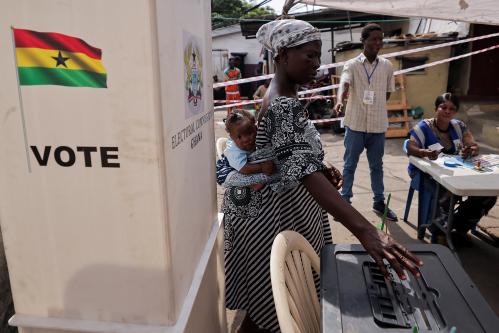In the United States and Western Europe, a vibrant debate has erupted on the future of capitalism and how to revamp prevailing economic models to address grievances and meet new demands for redistribution and social and environmental protection. Following the twin shocks of 2016—the U.K. Brexit vote and the election of Donald Trump in the U.S.—right-leaning nationalism and populism appear to be gaining steam, buoyed by the public’s dissatisfaction with globalization. At the same time, the political left is also growing more ambitious and confident; for instance, according to one recent poll, Americans aged 18-29 have a more positive view of socialism than of capitalism. Overall, the elite consensus surrounding the neoliberal economic model—which advocated a relatively small role for government, deregulating markets to encourage competition, and liberalized international trade and financial policies—is teetering.
In emerging markets, meanwhile, a related series of debates are unwinding, and have been for many years. Among these countries, the neoliberal economic model peaked in popularity sometime in the 1990s, in the aftermath of the collapse of the Soviet Union and amidst optimism in an accelerating globalization, epitomized in the creation of the World Trade Organization (WTO). Even at its peak, however, the neoliberal reform program was always implemented unevenly across countries and adapted to local contexts. Since then, a number of alternative models have been proposed in response to a series of economic and political shocks, from the Asian financial crisis to the “Pink Tide” in Latin America to the Arab Spring. These experiences provide a fertile ground for assessing the possible futures of capitalism, across both emerging and developed markets.
To debate these related issues, Brookings recently hosted a group of 45 leading economists and political scientists for a day and a half workshop on the state of neoliberalism and its alternatives across emerging markets. The meeting produced a rich, nuanced, and contested discussion on evolving economic and political priorities. Overall, while participants broadly agreed that the neoliberal moment had passed, there was significant variation in what could—and should—come next.
One cross-cutting theme was whether the existing neoclassical economics paradigm should maintain its pre-eminent place in economic policymaking, or if more eclectic, heterodox approaches were needed.
A number of participants argued that, though some policymakers inspired by neoliberalism may have dismissed concerns such as inequality and environmental degradation in the past, such policy recommendations don’t necessarily follow from the principles of neoclassical economics. Indeed, neoclassical economics allows for the possibility of both government and market failures, and has much to say on topics such as how to provide public goods. For instance, taxing environmental externalities is a textbook neoclassical economics policy recommendation; the fact that some policymakers have neglected it does not mean we need a search for new economic models. Critics that conflate crude neoliberal policies with the neoclassical economic paradigm risk throwing out the baby with the bathwater.
Conversely, other workshop participants advocated that changes to economic thinking were needed to deliver more radical policy reforms. Neoclassical economics’ focus on individual incentives and utility maximization misses much bigger questions about structural power relations, which play a central role in determining economic outcomes. Similarly, individuals’ desires for status, happiness, and identity are first order concerns, and cannot be easily incorporated into neoclassical models based on assumptions of rationality. Alternative, heterodox approaches to economics—which had flourished in earlier eras but lost ground to neoclassical approaches in recent decades—are due for a revival. Such approaches could, for example, pay more attention to crises, tipping points, and transitions rather than equilibria outcomes; provide a richer treatment of power and politics; and study how governments create and shape markets, rather than simply respond to market failures.
Ultimately, whether participants favored working within or beyond the neoclassical framework, there was general agreement that the current policy toolkit was insufficient for addressing contemporary demands for change. To date, the ambition of specific policy proposals appears to have lagged behind the diagnoses of shortcomings in existing systems.
This suggests the need for a broad research agenda on how economic and political models are evolving across emerging markets, and what lessons may be translatable across country contexts. The workshop was one piece of a broader Brookings project seeking to advance this conversation. In the weeks and months ahead, we’ll be writing more on this wide-ranging topic—stay tuned.
The Brookings Institution is committed to quality, independence, and impact.
We are supported by a diverse array of funders. In line with our values and policies, each Brookings publication represents the sole views of its author(s).








Commentary
The future of capitalism in emerging markets
February 7, 2019